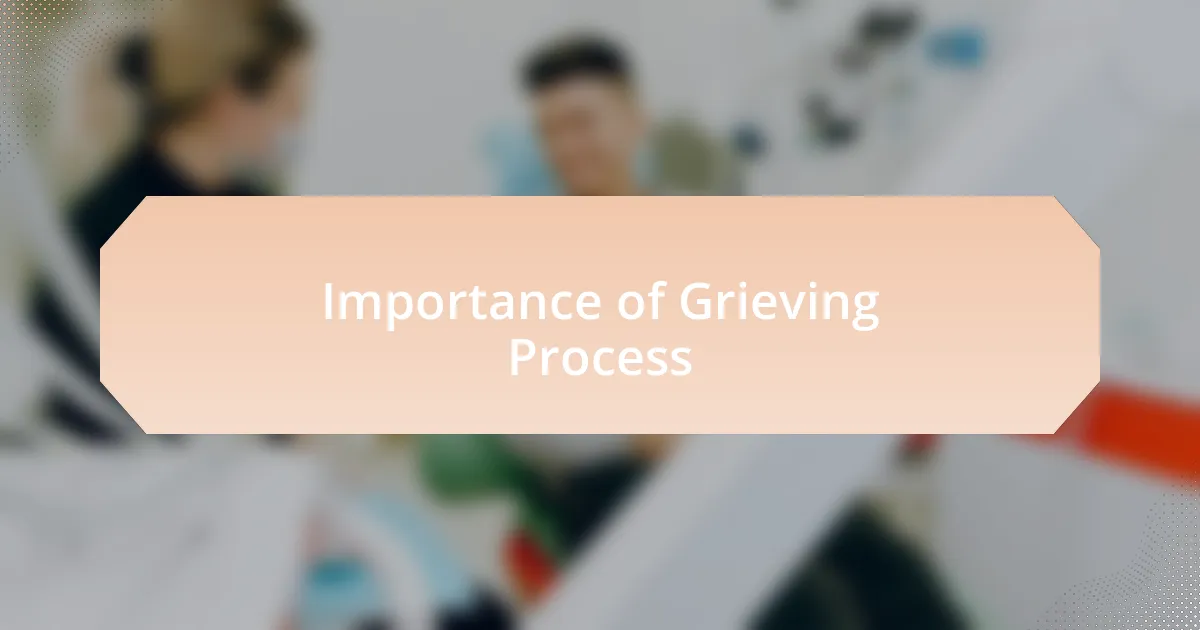Key takeaways:
- Hospital ministry bridges the clinical and spiritual realms, emphasizing the importance of genuine presence and emotional support during times of grief.
- The grieving process is not linear; sharing experiences with others can foster connection and healing, helping individuals feel less isolated.
- Practical support and simple gestures, like sharing meals or offering handwritten notes, can significantly comfort those navigating grief.
- Finding purpose in pain can drive individuals to help others, creating meaningful connections and transforming grief into compassion.

Understanding Hospital Ministry
Hospital ministry serves as a compassionate bridge between the clinical and spiritual realms. I recall a moment when I sat by a friend’s bedside, feeling overwhelmed by emotions while trying to be a source of comfort. It struck me then how vital it is for chaplains and caregivers to offer not just prayers, but genuine presence and understanding at a time when words often fail.
In my experience, hospital ministry isn’t just about religious rituals; it’s about creating a safe space where individuals can express their fears, hopes, and even grief. I remember speaking with a patient who shared her deep anxiety about an upcoming surgery. Engaging in that conversation reminded me of the importance of listening—sometimes, that’s all someone needs to feel supported and less isolated in their fears.
What truly resonates with me is the way hospital ministry emphasizes the healing power of relationships. I once witnessed a caregiver hold the hand of a grieving family member, offering silent support that spoke volumes. It makes me wonder: how often do we overlook the simple yet profound impact of our presence on someone’s healing journey?

Importance of Grieving Process
The grieving process is essential because it allows us to confront our emotions and accept the reality of loss. I remember when I lost a dear friend; I often found myself in quiet moments, reflecting on the memories we shared. Those moments of sorrow became the groundwork for healing, reminding me that it’s okay to feel the weight of grief.
When I spoke about my feelings in a supportive group, I realized how cathartic it can be to share our pain. Hearing others voice their struggles helped me see that I wasn’t alone; grief is a universal experience. This connection can be vital, especially in a hospital ministry setting, where many face endings and new beginnings simultaneously.
In my experience, processing grief isn’t linear; it ebbs and flows like the tide. There were days when I would recall happier memories and feel a sense of comfort, yet other days, that same memory would trigger deep sadness. Have you ever experienced a similar rollercoaster of emotions? It’s a reminder that each person’s journey through grief is unique and deserves the time and space to unfold naturally.

How Hospital Ministry Helps
Hospital ministry plays a crucial role in providing emotional support during times of grief. I vividly recall a moment when a chaplain sat with me in silence, allowing me to express my feelings without any pressure to conform to societal expectations of mourning. Just being there, listening attentively, showed me that it’s okay to process my emotions at my own pace.
In addition to offering a compassionate ear, hospital ministry often brings people together who are experiencing similar losses. I found comfort in a small group that met regularly to share our stories. We exchanged laughter, tears, and memories, creating a safe space to heal, which reinforced the idea that community support amplifies our ability to cope. Have you ever found strength in shared grief? It’s a powerful reminder that healing is often a collective journey.
Furthermore, spiritual care within hospital ministry can provide profound comfort. I remember attending a candlelight vigil organized by the ministry in honor of those we had lost. The act of lighting a candle while surrounded by others grappling with their own grief was incredibly poignant. It made me realize how important it is to celebrate lives and provide space for reflection, weaving together personal grief with a collective memory.

Personal Experiences of Grief
Grief can feel isolating, yet I remember a time when I unexpectedly found solace in an old photo album. As I flipped through its pages filled with memories of laughter and adventures with my friend, a wave of nostalgia washed over me. Have you ever experienced that bittersweet moment when you realize that while your loved one is gone, the memories you shared remain vibrant and alive?
In the midst of my sorrow, I had a conversation with a mutual friend who had also lost someone dear. Sharing our memories felt like walking a tightrope between joy and sadness, but it was in that vulnerable exchange that I truly understood the healing power of connection. Isn’t it fascinating how talking about our lost loved ones can bring their essence back into our lives, even for just a moment?
There were evenings when the weight of grief felt unmanageable, and I would seek solace in nature. One night, I sat by a serene lake, the moon reflecting on the water’s surface. I talked to my friend aloud, recounting our adventures, and it struck me how these moments of solitude didn’t diminish my grief but rather transformed it into a dialogue filled with love and remembrance. How do you navigate your moments of solitude in grief? I find that these conversations, whether with the universe or within ourselves, can be one of the most profound ways to honor those we’ve lost.

Supporting a Friend in Grief
Supporting a friend in grief requires a delicate blend of empathy and presence. I recall a time when a friend reached out to me during a particularly heavy moment of mourning. Instead of offering solutions, I simply listened as they shared tales of their loved one. It was a powerful reminder of how sometimes, just being there, without judgment or expectation, can provide immense comfort to someone navigating the storm of loss.
One evening, I prepared a simple meal for another grieving friend, opting for their favorite dishes. As we sat together in silence, punctuated only by the soft clinking of silverware, I realized that sharing comfortable spaces can create an atmosphere where feelings can be freely expressed. Have you ever thought about how the act of breaking bread together can foster deeper connections, especially in times of sorrow? In those quiet moments, we found a way to remember and honor our shared joys while allowing grief to exist without pressure.
There’s something profound about practical support during grief. I once sent a handwritten note with a few cherished memories of my friend who had passed, and the gratitude expressed was overwhelming. It dawned on me that small gestures can sometimes mean the world to someone who feels lost. Isn’t it incredible how something as simple as a note can reignite treasured memories and let a friend know they’re not alone on their grief journey?

Finding Purpose in Pain
Finding purpose amid pain can be an unexpected journey. I remember sitting on a park bench after losing a close friend, my heart heavy yet filled with thoughts of how he had impacted my life. That moment sparked a realization; perhaps my grief could drive me to honor his memory by living authentically and embracing each day with a renewed sense of purpose. Have you ever found yourself reflecting on the legacy of someone you’ve lost and thinking about how that might shape your own life?
Through my own grieving process, I’ve discovered that pain often serves as a catalyst for growth. After my friend passed, I turned to volunteering at a local support group for those dealing with loss. Helping others heal while navigating my own sorrow created a sense of connection and meaning. This experience taught me that my grief can be transformed into compassion, allowing me to support others in their darkest times. How has your own experience with loss shifted your perspective on helping others?
Ultimately, I’ve learned that finding purpose in pain requires an open heart and willingness to reflect on what truly matters. There have been nights when sleep eluded me, and I found solace in writing down my feelings. Each word felt like a step toward healing, articulating thoughts that had long lingered in silence. Isn’t it fascinating how creativity can emerge from our deepest sorrow, guiding us toward understanding ourselves better?

Moving Forward After Loss
Moving forward after loss is often a gradual process, one that can feel overwhelming at times. I remember sitting on my bed weeks after my friend passed, feeling like I was in a fog that just wouldn’t lift. But slowly, I began to identify small steps I could take—like going for walks in nature or even revisiting places we used to enjoy together. These actions helped me navigate through the heaviness, reminding me that it’s okay to feel joy again while still carrying the memory of my friend.
There was a particular day when I noticed my laughter returning over a shared memory. It caught me off guard; I had thought this type of happiness was lost forever. This moment shifted my perspective, illustrating that moving forward does not mean forgetting. Instead, it’s about integrating those memories into my life, allowing them to coexist with my new experiences. Isn’t it comforting to know that our loved ones can be a part of our journey, even in their absence?
Reflecting on my path through grief, I realized that creating new traditions has been profoundly healing. I started a small ritual on my friend’s birthday, lighting a candle and sharing a meal with those who knew him. Each year, it became a celebration of life rather than a day marked by sorrow. How have you honored the memory of someone you’ve lost? This journey of remembrance has not only brought me closer to others but has also cultivated a deep sense of community and love amidst the pain.